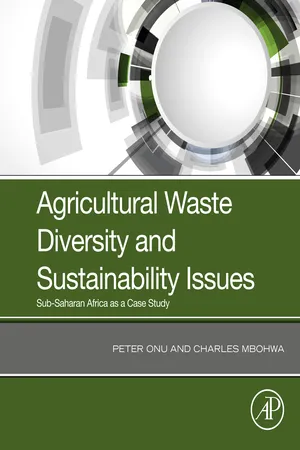
Agricultural Waste Diversity and Sustainability Issues
Sub-Saharan Africa as a Case Study
- 204 pages
- English
- ePUB (mobile friendly)
- Only available on web
Agricultural Waste Diversity and Sustainability Issues
Sub-Saharan Africa as a Case Study
About This Book
Agricultural Waste Diversity and Sustainability Issues: Sub Saharan Africa as Case Study presents solutions for overcoming limitations, guiding developmental processes, and improving knowledge transfer in agricultural waste management and development. The book gives considerable attention to treatment and conversion, with best management practices involving the reduction and elimination of waste volume in its various forms, sectors and streams. Sections cover waste management in the agriculture and food sector, including methodological approaches in waste preparation and processes, the most important energy generation techniques and strategies, and best practices, management, sustainability, associated technologies, accountability, communications, and involvement surrounding diverse stakeholders.
Agricultural Waste Diversity and Sustainability Issues: Sub Saharan Africa as Case Study illustrates the use of mathematical models to minimize operational cost in agro-waste management processes and discusses the application of eco-efficiency. Ultimately, the book focuses on the prospect of agro-wastes management and risk associated in the sub-Saharan African region, including Nigeria, Uganda, and South Africa as case studies.
- Captures a solutions-based assessment that redresses the challenges created by a poor biodiversity strategy in Sub-Saharan Africa to meet present needs in SSA and around the world
- Provides foundational information for agricultural diversity, food waste elimination, clean energy production, and technology emergence
- Enables a greater understanding of the state-of-the-art approach for effective biodegradable waste management
- Inspires further research into sustainable and cost-effective biowaste operations, wastes management models, methodologies for utilization and nascent technologies that are capable of bolstering clean energy generation
Frequently asked questions
Information
Table of contents
- Cover image
- Title page
- Table of Contents
- Copyright
- Preface
- Acknowledgment
- Chapter 1. Waste management and the prospect of biodegradable wastes from agricultural processes
- Chapter 2. Agricultural wastes and opportunities in the food production chain
- Chapter 3. Methodological approaches in agrowaste preparation and processes
- Chapter 4. Sustainable agricultural waste diversity: advances in green energy and materials production
- Chapter 5. Sustainable agrowaste diversity versus sustainable development goals
- Chapter 6. New approach and prospects of agrowaste resources conversion for energy systems performance and development
- Chapter 7. Overview of models for agricultural waste management, and trends in biofuels production
- Chapter 8. Nascent technologies in resources conservation and sustainable agricultural development
- Chapter 9. Which way forward: agricultural waste management and the fourth industrial revolution appraisal
- Chapter 10. Economics and risk assessment of new technologies in agrowaste diversity
- Index